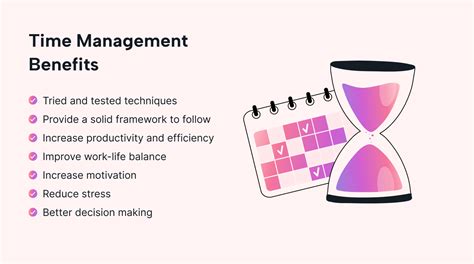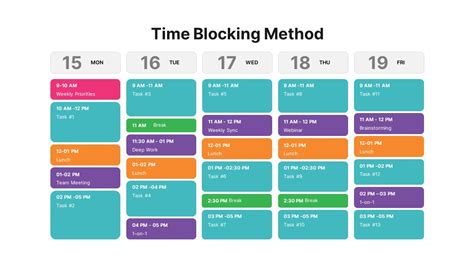In today's fast-paced world, the mastery of time has become an increasingly sought-after skill. In order to excel in both personal and professional life, individuals need to cultivate effective time management strategies. By adopting a mindful approach to organizing your daily activities, you can unlock a wealth of possibilities and optimize your productivity. In this article, we present five powerful techniques that will empower you to take control of your time and maximize your potential.
First and foremost, to successfully navigate the intricate landscape of time management, it is essential to prioritize your tasks. Recognize the importance of distinguishing between urgent and important responsibilities. By clearly identifying and focusing on the tasks that truly demand your attention, you can avoid getting overwhelmed and ensure that your efforts are channeled towards achieving meaningful results.
Moreover, learning to delegate effectively can significantly enhance your time management proficiency. Acknowledge that you cannot do everything by yourself. By entrusting certain tasks to others who possess the necessary skills, you free up valuable time and energy to allocate towards more significant endeavors. Remember, a strong leader knows when to delegate, harnessing the collective potential of a team to amplify productivity and achieve greater success.
In addition, incorporating effective goal-setting techniques into your daily routine can revolutionize your time management approach. By setting specific, measurable, attainable, relevant, and time-bound goals (SMART goals), you provide yourself with a clear roadmap towards accomplishing your objectives. Breaking down larger tasks into smaller, manageable segments not only makes them less daunting but also allows for better planning and execution, which is crucial for optimal time utilization.
Furthermore, embracing the power of technology can prove to be a game-changer in your quest for effective time management. Utilize digital tools such as calendar apps, project management software, and time-tracking applications to streamline your workflow and ensure that every minute counts. Automation and task reminders can help you stay organized, eliminate unnecessary delays, and stay on top of deadlines, leaving you with more time to focus on tasks that require your undivided attention.
Last but not least, incorporating mindful practices such as meditation and mindfulness exercises can greatly improve your time management skills. By cultivating present-moment awareness, you develop the ability to stay focused, avoid distractions, and make conscious choices about how you invest your time. By integrating mindfulness into your daily routine, you create a space for clarity, creativity, and intelligent decision-making, enabling you to manage time with greater efficiency and purpose.
Ultimately, the art of time management lies in the ability to harness every second, every minute, and every hour effectively. By integrally implementing these five mindful strategies into your life, you will elevate your time management skills to new heights, achieving a harmonious balance between productivity and personal fulfillment.
Increase Your Productivity with These Effective Time Management Techniques

Enhancing your efficiency and output requires mastering the art of managing your time effectively. By incorporating a range of proven strategies into your daily routine, you can optimize your productivity and achieve your goals more efficiently.
- Set Priorities: Start by identifying and prioritizing your tasks based on their importance and urgency. This will help you stay focused on the most critical tasks and avoid wasting time on less significant ones.
- Create a Schedule: Establish a structured schedule that allocates time for specific activities, such as work, personal commitments, and leisure. By adhering to a well-planned schedule, you can make the most of your available time.
- Break Tasks into Manageable Segments: Instead of overwhelming yourself with a large task, break it down into smaller, more manageable segments. This approach allows you to tackle each segment effectively without feeling overwhelmed.
- Eliminate Time Wasters: Identify and eliminate activities or distractions that consume excessive amounts of your time without adding any value to your productivity. This can include minimizing the use of social media, reducing unnecessary meetings, or delegating tasks when possible.
- Utilize Time-Management Tools: Take advantage of technology and productivity tools that can assist you in organizing and managing your time more efficiently. This can include using task management apps, calendar reminders, or time-tracking software to stay on top of your tasks and deadlines.
By implementing these effective time management techniques, you can boost your productivity levels and achieve a greater sense of accomplishment in both your personal and professional life. Remember, effective time management is a skill that can be developed through practice and consistency.
Set Clear Goals and Prioritize Tasks
When it comes to effectively managing your time, one crucial aspect is setting clear goals and prioritizing tasks. By defining your objectives and determining which tasks are most important, you can ensure that you stay focused and make progress towards your desired outcomes.
- Define your objectives: Start by clearly identifying what you want to achieve. Set specific, measurable, achievable, relevant, and time-bound (SMART) goals that align with your overall aspirations.
- Break down tasks: Once you have established your goals, break them down into smaller, manageable tasks. This allows you to have a clear understanding of the steps you need to take to reach your objectives.
- Prioritize tasks: Not all tasks are equally important or urgent. Prioritizing tasks involves evaluating their importance and urgency and organizing them based on their impact on your overall goals. Consider using a prioritization matrix or the Eisenhower Matrix to categorize tasks into four quadrants: urgent and important, important but not urgent, urgent but not important, and neither urgent nor important.
- Focus on high-priority tasks: After prioritizing your tasks, focus on completing the high-priority ones first. These are the tasks that will have the greatest impact on achieving your goals and should receive your primary attention.
- Review and reassess regularly: As circumstances may change, it is essential to review and reassess your goals and tasks regularly. This allows you to make necessary adjustments, reallocate priorities, and stay on track towards achieving your desired outcomes.
By setting clear goals and prioritizing tasks, you can better manage your time and ensure that your efforts are directed towards meaningful and impactful activities. Remember to regularly review and reassess your goals to stay aligned with your overall objectives.
Boost Efficiency with Time-Blocking Technique

Unlock the secret to maximizing productivity by incorporating the highly effective strategy of time-blocking into your routine. This approach involves breaking down your schedule into designated blocks of time, allowing you to organize your tasks and activities more efficiently.
Enhance Focus and Concentration: By allocating specific time periods for various tasks or projects, you can minimize distractions and maintain better focus. This structured approach helps prevent multitasking and encourages deep work, resulting in improved concentration and higher quality output.
Improve Time Allocation: Time-blocking enables you to allocate appropriate amounts of time to each task, ensuring that you devote enough attention and effort to complete it effectively. By setting specific time limits, you become more aware of time management and avoid getting caught up in unproductive activities.
Prioritize Important Tasks: With time-blocking, you have the ability to prioritize tasks based on their significance and urgency. By setting aside dedicated blocks for important tasks, you can ensure they receive the attention they deserve, avoiding procrastination and achieving better results.
Create a Visual Schedule: Visualizing your day through time-blocking allows for better overall planning and organization. By dividing your day into distinct blocks, you can easily identify potential gaps or overlaps and make necessary adjustments to optimize your schedule.
Facilitate Work-Life Balance: Time-blocking helps maintain a healthy work-life balance by allotting specific periods for personal activities, relaxation, and self-care. By consciously scheduling time for leisure and rejuvenation, you can reduce stress, prevent burnout, and improve your overall well-being.
Embrace the power of time-blocking and reap the rewards of increased productivity and efficiency. By implementing this technique, you can take control of your schedule, make the most of your time, and achieve your goals with greater ease.
Minimize Distractions and Maintain Concentration
In order to optimize your time management abilities and enhance your productivity, it is essential to minimize distractions and maintain focused attention on your tasks. By eliminating unnecessary disruptions and staying fully engaged in your work, you can achieve greater efficiency and accomplish tasks more effectively.
Here are some strategies to help you minimize distractions and stay focused:
| 1 | Avoid Multitasking | Avoid trying to accomplish multiple tasks simultaneously, as this can lead to decreased productivity and reduced concentration. Instead, focus on one task at a time, dedicating your full attention and energy to completing it efficiently. |
| 2 | Organize Your Workspace | Ensure your workspace is clean, clutter-free, and well-organized. This will create a conducive environment for concentration and prevent visual distractions that can hinder your ability to stay focused on your work. |
| 3 | Establish Priorities | Prioritize your tasks based on their importance and urgency. By identifying and focusing on high-priority tasks first, you can avoid wasting time on less critical activities and maintain a clear direction in your work. |
| 4 | Set Time Blocks | Allocate specific time blocks for each task or category of tasks. This helps you maintain discipline and avoid succumbing to distractions during designated work periods. Stick to these time blocks strictly to ensure optimal productivity. |
| 5 | Eliminate Digital Distractions | Minimize the impact of digital distractions such as email notifications, social media alerts, and non-work-related websites. Disable unnecessary notifications or use applications that block certain websites during designated work sessions to maintain focus on your tasks. |
By incorporating these strategies into your daily routine, you can minimize distractions, enhance your concentration, and ultimately improve your time management abilities. Remaining focused on your crucial tasks will enable you to prioritize effectively, work more efficiently, and achieve your goals more successfully.
Efficiently Distribute and Outsource Responsibilities to Streamline Your Workload

Effective time management involves more than just personal organization and productivity. It also entails recognizing when to delegate and outsource tasks to others, allowing you to optimize your time and focus on higher-priority activities.
By skillfully distributing responsibilities among your team members or outsourcing tasks to external professionals, you can enhance your overall efficiency and productivity. Delegating tasks not only ensures that workload is evenly distributed but also enables individuals with specific expertise to handle tasks more effectively, resulting in improved outcomes.
Furthermore, outsourcing certain tasks to specialized professionals can be a strategic move, particularly for non-core activities that require specific skills and knowledge. This frees up your time and allows you to redirect your efforts towards areas where you can add the most value and achieve better results.
When delegating or outsourcing, it is important to assess the skills and capabilities of individuals or service providers to ensure that tasks are assigned to the most suitable candidates. Clear communication and proper training are also essential to ensure that delegated tasks are carried out correctly and meet the required standards.
Remember that effective delegation and outsourcing are vital time management tools that allow you to optimize your workload and focus on tasks that align with your areas of expertise. By strategically assigning responsibilities to others, you can increase efficiency, productivity, and ultimately achieve better overall results.
Embrace Rest and Self-Care to Optimize Productivity
As individuals navigate their daily routines, it is crucial to acknowledge the importance of taking regular breaks and practicing self-care. While many may underestimate the impact of rest and looking after oneself, incorporating these habits into a time management strategy can significantly enhance overall productivity and effectiveness. By recognizing the significance of rejuvenation and self-nurturing, individuals can better manage their time and increase their ability to accomplish tasks efficiently.
Incorporating regular breaks into one's schedule allows for mental and physical revitalization. Engaging in activities that promote relaxation and provide a change of scenery can serve as a reset button for the mind, improving focus and concentration. Rather than perceiving breaks as a waste of time, they should be seen as valuable opportunities for recharging and reenergizing. Whether it is going for a short walk, practicing deep breathing exercises, or engaging in a hobby, taking intentional breaks can alleviate stress and prevent burnout. |
Furthermore, self-care should not be underestimated when it comes to effective time management. Giving oneself permission to engage in activities that bring joy and fulfillment helps to maintain a healthy work-life balance. Whether it involves spending quality time with loved ones, pursuing hobbies, or engaging in activities that promote physical and mental well-being, prioritizing self-care can lead to increased long-term productivity. Taking care of one's own needs and overall well-being allows for greater focus and motivation when it comes time to tackle tasks and responsibilities. |
Additionally, incorporating self-care practices can help improve overall time management skills by providing individuals with a sense of clarity and purpose. By taking the time to reflect, set goals, and prioritize tasks, individuals can develop a clear understanding of what truly matters and how to allocate their time effectively. Self-care activities, such as journaling or meditation, can aid in this process by fostering self-reflection and self-awareness. This introspection allows individuals to make mindful decisions about how they spend their time and ensures that their actions align with their values and objectives. |
In conclusion, taking regular breaks and practicing self-care are crucial components of effective time management. By incorporating intentional downtime and prioritizing activities that promote well-being, individuals can enhance their overall productivity, focus, and ability to accomplish tasks efficiently. Rest and self-nurturing should not be seen as indulgences or distractions but rather as essential strategies for optimizing time management and achieving long-term success. |
FAQ
How can I improve my time management skills?
Improving time management skills can be done through various techniques and strategies. Here are five tips to help you get started:
What is the importance of time management?
Time management is crucial for effective and efficient work. It allows you to prioritize tasks, reduce stress, and achieve better productivity and success in both personal and professional life.
What are some common time management mistakes?
There are several common time management mistakes that people often make. These include procrastination, poor planning and organization, not setting realistic goals, and failing to prioritize tasks effectively.
Is it possible to balance work and personal life through time management?
Absolutely! Time management skills can help you strike a healthy work-life balance. By prioritizing tasks, setting boundaries, and effectively managing your schedule, you can allocate time for both work and personal activities.
How can I overcome procrastination and stay focused?
Overcoming procrastination requires self-discipline and effective time management techniques. Some strategies to stay focused include breaking tasks into smaller, manageable chunks, setting deadlines for yourself, eliminating distractions, and using positive reinforcement.
What are some practical tips for improving time management skills?
There are five practical tips mentioned in the article to improve time management skills. These include setting clear goals, prioritizing tasks, using a time management system or tool, avoiding multitasking, and learning to delegate responsibilities.



